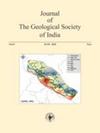利用 GIS 平台中的 SRTM DEM 和 GPS 数据,通过形态构造分析对印度北阿坎德邦 Kedarnath 附近的 Mandakini 河流域进行空间脆弱性调查
IF 1.2
4区 地球科学
Q3 GEOSCIENCES, MULTIDISCIPLINARY
引用次数: 0
摘要
为了评估曼达基尼河流域(面积为 1330 平方公里)及其周围地区的构造活动强度,我们在克达尔纳特附近开展了构造形态研究。最近,该地区发生了数次脆弱的山体滑坡和毁灭性的洪水。我们采用了分叉率(BR)、不对称系数(AF)、谷底宽度指数(Vf)、湿度指数(HI)、溪流长度梯度指数(SL 指数)、正弦指数(Sp)等定量参数以及排水方向调查和湿度曲线等两个定性参数来评估曼达基尼河流域不同流域的空间构造形态易感性。高 BR 值、中到高 AF 值和低 Vf 值表明,大部分靠近 MCT 的流域非常脆弱。高 Sp 值和中等 HI 值与持续的构造扰动和侵蚀有关。高 SL 指数表明溪流不同部分的构造高度不稳定,容易受到构造扰动。相对活跃构造指数还表明,构造活动的变化从非常活跃到非常活跃不等。研究区域的区域地质和低阶溪流走向调查显示,喜马拉雅造山运动最初的东北-西南缩短方向在后期旋转为东北-西南方向。由此产生的变形方式表现为 NW-SE 和 NE-SW 走向线状构造,以及 WNW-ESE 走向推力构造,并适度向北倾斜。经过处理的全球定位系统数据显示,最大主压缩方向的旋转和由此产生的应变重新调整与印度板块沿逆时针方向的旋转有关,这导致了不同不连续面的走向、最大剪应力条件的形成、内部摩擦力的减弱以及低强度岩石阻力的减弱。凯达尔纳特地区目前的构造设置极易造成毁灭性的洪水和脆弱的山体滑坡。本文章由计算机程序翻译,如有差异,请以英文原文为准。
Spatial Vulnerability Investigation by Morphotectonic Analysis of the Mandakini River Basin near Kedarnath, Uttarakhand, India using SRTM DEM in a GIS Platform and GPS Data
Tectonomorphic study was carried out to evaluate the intensity of tectonic activity in and around the Mandakini River basin (1330 sq. km area) near Kedarnath. The area has witnessed several vulnerable landslides and devastating floods in the recent past. Quantitative parameters such as Bifurcation Ratio (BR), Asymmetry Factor (AF), Valley floor width Index (Vf), Hypsometric Integral (HI), Stream-length gradient Index (SL index), Sinuosity Index (Sp) and two qualitative parameters such as drainage orientation survey and the hypsometric curve is used to evaluate the spatial tectonomorphic susceptibility of the different watersheds of the Mandakini River basin. High BR, medium to high AF and low Vf show a very high vulnerability mostly close to MCT. High Sp and medium HI values are linked with continuous tectonic disturbances followed by erosion. High SL index demarcates high tectonic instability along different portions of streams which is prone to tectonic perturbation. The Index of Relative Active Tectonic also suggests variability in tectonic activities varies from very high tectonic activity to high tectonic activity. Regional geology and lower-order stream orientation survey of the study area revealed that the initial NE-SW shortening direction of the Himalayan orogeny is rotated to the N-S direction in the later stage. The resulting deformation style is expressed by the NW–SE and NE–SW striking lineaments and WNW–ESE striking thrust dipping moderately toward the north. Processed GPS data shows the rotation of the maximum principal compression direction and resultant readjustment of strains are linked with the revolving of the Indian Plate in the anticlockwise direction which is responsible for the orientation of different discontinuities, developing maximum shear stress conditions, weak internal friction and negligible resistance by low-strength rock. The present tectonic setup of the Kedarnath region is highly susceptible to devastating floods and vulnerable landslides.
求助全文
通过发布文献求助,成功后即可免费获取论文全文。
去求助
来源期刊
CiteScore
2.20
自引率
7.70%
发文量
233
审稿时长
6 months
期刊介绍:
The Journal aims to promote the cause of advanced study and research in all branches of geology connected with India, and to disseminate the findings of geological research in India through the publication.

 求助内容:
求助内容: 应助结果提醒方式:
应助结果提醒方式:


